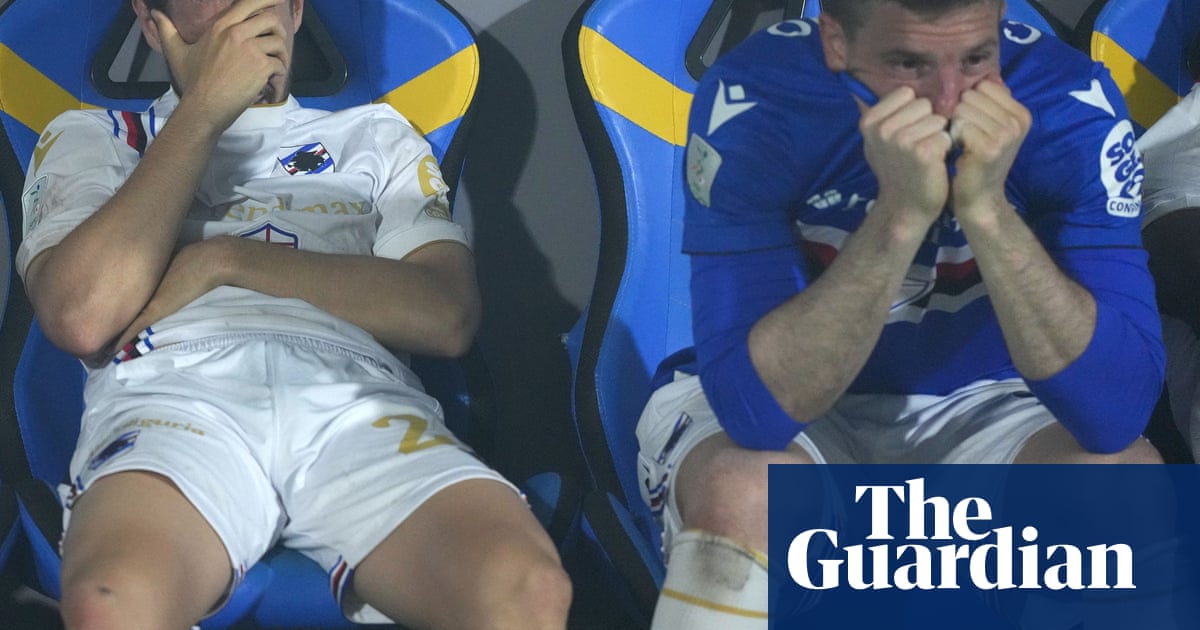It was not meant to go like this. On a Tuesday evening on the outskirts of Naples,Sampdoria– one of the most beloved Italian clubs of the past 40 years – slipped into Serie C with a whimper – the first time in the club’s history that they have been relegated to Italy’s third tier.
At the final whistle, following a dismal goalless draw at Juve Stabia, Sampdoria’s players wept on the pitch. Back home, fans of the club’s intercity rivals, Genoa,spilled out on to the shared streets in celebration, setting off fireworks, chanting “Sampdoria is no more”. That is not quite the case, but it’s going to be a long way back forIl Doria, who have long been more accustomed to battling with Juventus than Juve Stabia.
Memories of that legendary era in the late 1980s and early 90s seem distant now, as Sampdoria’s young and obscenely talented Italians, namely the late Gianluca Vialli and Roberto Mancini, swaggered their way to the 1991 Scudetto in one of the most iconic football shirts of all time; a blue, white red and black masterpiece.
Their accomplishments in winning four Coppa Italia titles between 1985 and 1994, the 1990 European Cup Winners’ Cup and even their European Cup final appearance against Barcelona at Wembley in 1992 were both incredible and an unsustainable benchmark for the future. Yet, even after Sampdoria’s relegation from Serie A in 2023, nobody saw this coming.
How did it come to this? In Serie B this season, Sampdoria have cycled through four managers, the first of whom was Andrea Pirlo. The Italian guided La Samp to a playoff place in 2023-24 but after a poor start to this season, was sacked after just three games. Andrea Sottil lasted until December but the worst was to come under Leonardo Semplici, who averaged far less than a point per game between Christmas and his departure in April. Angry supporters reacted by throwing stones and flares at Semplici and his staff on the team bus shortly before his exit.
The latest manager is Alberico Evani, who you might remember from Italy’s triumphant Euro 2020 campaign as an assistant to Mancini,going viral on the sidelineswith his immaculate moustache, trendy spectacles and designer suits. Evani was appointed last month with club (and Crystal Palace) legend Attilio Lombardo as his assistant and lost only one of his six games in charge. Ultimately, though, nine points from those six games was not enough, with Sampdoria a point shy of safety.
Club legend Mancini joined Sampdoria in an advisory role this season after the former Manchester City manager left his post as Saudi Arabia head coach last year. Many fans blame Sampdoria’s sporting director, Mancini’s son Andrea, for their current plight. This season has seen the club field 38 players, including five different goalkeepers. Recent attempts to further bolster the squad have also failed. M’Baye Niang, the former Milan striker who is still 30 years old, joined in January on a six-month contract but has scored just three times in 16 matches. Sampdoria’s problems are bigger than a misfiring striker but Niang spurning two gilt-edged chances on Tuesday at Juve Stabia, when a single goal would have saved them from automatic relegation, was particularly painful.
It is not just the players of yesteryear that Sampdoria fans are pining for. Paolo Mantovani is a legendary figure in the club’s history, having guided Sampdoria through their golden era as president from 1979 until his death in 1993. Recent owners and suitors have struggled to provide stability: Massimo Ferrero stepped down in 2021 after being jailed as part of an investigation into corporate crimes and bankruptcy. Vialli tried to lead a conglomerate to purchase Sampdoria before ill health andhis death in January 2023, before a consortium led by London-based financier Matteo Manfredi succeeded in buying the club (alongside Andrea Radrizzani, although the former Leeds United owner has since stepped aside).
However, the new regime’s scattergun approach to managers and signings – bringing in players as varied as veteran forward Fabio Borini and 21-year-old Barcelona starlet Estanis Pedrola – has failed, with a crisis of confidence spreading from the boardroom to the players and the fans on the terraces.
Sign up toFootball Daily
Kick off your evenings with the Guardian's take on the world of football
after newsletter promotion
What is next? Serie C is a regional division split geographically into three groups from north to south. The top and bottom-placed teams in these three mini-leagues are promoted and relegated automatically, with the rest decided by a complex series of playoffs. Many of the stadiums at this level have a capacity of fewer than 2,000 (as a comparison, there are no grounds that small even in the National League South, the sixth-tier of English football).
Sampdoria are a giant at this level – the biggest club to drop to Serie C that weren’t relegated directly because of financial issues – but promotion next season is not a given. There are many recent Serie A alumni already lurking here: Crotone, Perugia, Vicenza, Catania and Pescara are just some of the larger clubs all fighting to return to their former glories. SPAL, who were in Serie A as recently as five years ago, even face a nervy relegation playoff against Milan’s reserve side this Saturday in a desperate bid to avoid dropping into Serie D.
At Sampdoria this summer, uncertainty has permeated every level of the club as the dust settles on their relegation from Serie B, with 19 players out of contract this summer and Evani’s position under review. Will Manfredi continue to invest? Will Mancini take a more active role or quietly disappear? Whatever happens, Sampdoria and everyone with a rose-tinted fondness for those halcyon 90s days will be hoping that it doesn’t get any worse.
